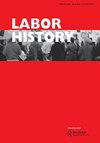The post-indenture of Chi, New South Wales, Australia, 1857–1908
IF 0.7
4区 管理学
Q1 HISTORY
引用次数: 0
Abstract
ABSTRACT Post-indenture has largely been neglected in historical examinations of Chinese indentured labour in colonial contexts. We know little about what happened to workers after their contracts expired. Through the life of one Chinese man, Chi, and his small farming community in late nineteenth- and early twentieth-century Illawarra, New South Wales, Australia, I consider this issue. Drawing chiefly on church and other records usually used for research into local and family history, sources in which Chi’s voice is often audible, this paper highlights a continuity between indenture and post-indenture. Indeed, Chi’s ‘freedom’ after indenture was qualified. This indicates, I argue, that further attention to post-indenture could enable us to better understand indenture itself, as a system that may have endured well beyond the expiration of the labour contract. Concentrating on the individual and small community, I also contend, holds value in this respect, as a way of further exploring the continuity between the two states, and as a means of incrementally forming a fuller picture of post-indenture in its own right.1857-1908年,澳大利亚新南威尔士州的契约制结束后
在对殖民地背景下中国契约劳工的历史考察中,后契约在很大程度上被忽视了。我们对工人在合同到期后发生了什么知之甚少。通过19世纪末20世纪初澳大利亚新南威尔士州伊拉瓦拉(Illawarra)一个名叫Chi的中国人和他的小农场社区的生活,我思考了这个问题。本文主要根据教会和其他通常用于研究地方和家族史的记录,在这些记录中经常可以听到迟氏的声音,强调了契约制和契约制后的连续性。的确,契约国后的“自由”是有资格的。我认为,这表明,对后契约的进一步关注可以使我们更好地理解契约本身,作为一种可能在劳动合同到期后仍然存在的制度。我还认为,关注个人和小社区在这方面具有价值,作为进一步探索两国之间连续性的一种方式,也是逐渐形成后契约时代更全面图景的一种手段。
本文章由计算机程序翻译,如有差异,请以英文原文为准。
求助全文
约1分钟内获得全文
求助全文
来源期刊

Labor History
Multiple-
CiteScore
1.00
自引率
28.60%
发文量
44
期刊介绍:
Labor History is the pre-eminent journal for historical scholarship on labor. It is thoroughly ecumenical in its approach and showcases the work of labor historians, industrial relations scholars, labor economists, political scientists, sociologists, social movement theorists, business scholars and all others who write about labor issues. Labor History is also committed to geographical and chronological breadth. It publishes work on labor in the US and all other areas of the world. It is concerned with questions of labor in every time period, from the eighteenth century to contemporary events. Labor History provides a forum for all labor scholars, thus helping to bind together a large but fragmented area of study. By embracing all disciplines, time frames and locales, Labor History is the flagship journal of the entire field. All research articles published in the journal have undergone rigorous peer review, based on initial editor screening and refereeing by at least two anonymous referees.
 求助内容:
求助内容: 应助结果提醒方式:
应助结果提醒方式:


